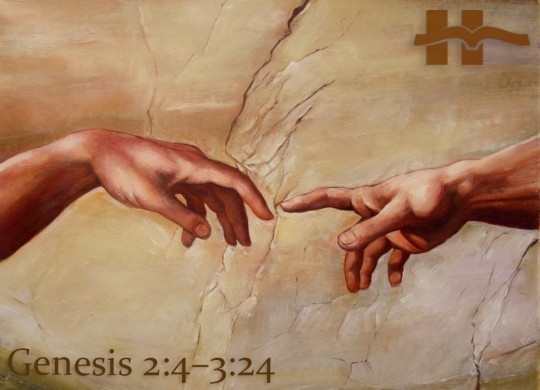Genesis 2:4−3:24

Man is to live in dependence upon the Creator, but the assertion of human independence from God—the root cause of sin—has devastating consequences.
This section commences with a refocus upon the creation of mankind—created to be dependent upon God (2:7), with God providing everything for its needs, for its existence and for its sustenance.
Optimal function within the divine order mandates the complementary functioning of male and female units; community is thus an essential requirement, established very early in the history of mankind. Needless to say, to be someone’s “help” (2:18) does not necessarily mean that the helper is weaker than the one helped: the descriptor “help” is used of God himself, Ps 30:11; 54:4.
As Matthew Henry said:
Woman was not made out of his head to top him, not out of his feet to be trampled upon by him, but out of his side to be equal with him, under his arm to be protected, and near his heart to be beloved.”
But this idyllic situation was soon to be overturned into chaos. Note the structure of 2:5–3:24:
A Introduction of humans into the Garden (2:5–17)
B Organization of human life (2:18–25)
C Temptation (3:1–5)
D Disobedience (3:6–7)
C’ Judgment (3:8–13)
B’ Reorganization of human life (3:14–21)
A’ Expulsion of humans from the Garden (3:22–24)
The infamy of sin takes the center position in this pericope. “God said” and “it was so” (1:3, 6, 7, 9, 11, 14, 15, 20, 24, 26, 30). But now suddenly God seems to have met his match: he says—and it is not so (3:1–7), as humans disobey him.
In the accusatory and judgmental phase of the narrative, notice that the tree of interest mentioned by God is not designated as the “tree of the knowledge of good and evil”; instead, he labels it “the tree of which I commanded you not to eat,” a description that is repeated (3:11, 17). The focus is upon the command of God, the voice of God, the demand of God, that had been repudiated.
If eating the fruit tree of life would have led to immortality (3:22), it is reasonable to assume that consuming the fruit of the tree of the knowledge of good and evil would have led to a knowledge of good and evil. It is likely that this “knowledge” is wisdom sought by mankind apart from God and his revelation.
Thus man had decided he would be the arbiter of what to eat and what not to, what to do and what not to, what to abide by and what not to. God’s words were not going to preclude him from making a decision of his own, even if it were contrary to divine order. This was ultimately a question of dependence upon God vs. independence from God.
And the result? Rather than being godlike and knowing good and evil after eating they fruit, all man and woman ended up knowing was that they were naked—a surprising twist, not at all what they bargained for! The actual consequences of the sin would have been comical, had it not been for the seriousness of the disobedience. And the consequences were dreadful for the first pair of humans and all their progeny.
God’s blessing (1:22, 28; 2:3) becomes God’s cursing (3:14, 17): the blessing to “multiply” species (1:28) turns into a cursing to “multiply” sorrow (3:16). Mankind would have to wait for another day for the curse to be removed.
[For more detail on this passage see the appropriate section of Genesis: A Theological Commentary for Preachers.]












 Abe Kuruvilla is the Carl E. Bates Professor of Christian Preaching at The Southern Baptist Theological Seminary (Louisville, KY), and a dermatologist in private practice. His passion is to explore, explain, and exemplify preaching.
Abe Kuruvilla is the Carl E. Bates Professor of Christian Preaching at The Southern Baptist Theological Seminary (Louisville, KY), and a dermatologist in private practice. His passion is to explore, explain, and exemplify preaching.